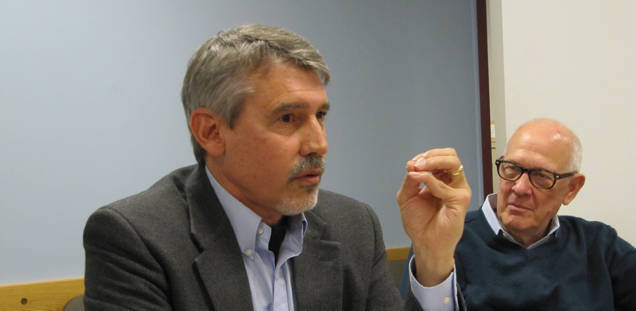November 19, 2014 — Frederick W. Mayer, professor of public policy, political science and environment at Duke University, discussed how storytelling plays a vital role in political and civic engagement.
Mayer first examined the power of story to shape social events when writing his undergraduate thesis at Harvard on a 1906 race riot in Atlanta. The riot, which resulted in the killing of more than 100 people, was “triggered by narrative,” specifically rape narratives published in the local newspaper, which were “central to the imagination of the Jim Crow South,” as a way of justifying oppression.
Stories can be an effective tool in overcoming collective action and free-rider problems, said Mayer. The belief that an individual vote or a small donation to a cause won’t make a difference can have serious implications for political causes. “If we all think that way, no one gives money, no one joins, no one marches,” said Mayer.
Storytelling operates on our emotions. It’s “illogical” for most people to care about climate change, said Mayer, because the impact will be felt “after we’re gone.” But the reason people care, he said, is that “there’s a story of impending tragedy.”
For a movement to take hold, individuals must be able to align their personal story with a larger collective narrative, said Mayer, citing Dr. Martin Luther King, Jr.’s “I Have a Dream” speech as an example. “Does he make a public policy argument about why this is a good thing to do? No. He tells a story,” said Mayer. That story allowed listeners to place themselves in the narrative, as an actor in history.
Effective movements—such as the Civil Rights movement and the recent shift in attitude toward gay marriage – figure out “how to find a narrative that resonates beyond the immediate community, to a larger community,” said Mayer.
Telling a story that will motivate people to action can be tricky, said Mayer. “We like stories with happy endings,” he said. A story composed entirely of bad news will inhibit action. “We tend to things that we think we can solve,” he said.
Mayer concluded with a word of caution. “I’m not arguing that it’s a good thing that stories are so powerful,” he said. “We can be misled, and we are. Part of why I try to talk about this is to arm people in a sense, against stories, because people are trying to manipulate us all time.”
Article and photo by Nilagia McCoy of the Shorenstein Center.


